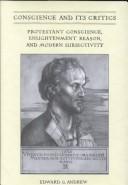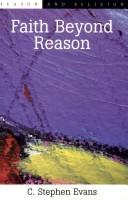| Listing 1 - 10 of 68 | << page >> |
Sort by
|
Book
ISBN: 0830866426 9780830866427 9780830852529 Year: 2019 Publisher: Downers Grove
Abstract | Keywords | Export | Availability | Bookmark
 Loading...
Loading...Choose an application
- Reference Manager
- EndNote
- RefWorks (Direct export to RefWorks)
Book
ISBN: 1622730755 1622730577 9781622730759 9781622730575 Year: 2016 Publisher: Wilmington, Delaware Vernon Press
Abstract | Keywords | Export | Availability | Bookmark
 Loading...
Loading...Choose an application
- Reference Manager
- EndNote
- RefWorks (Direct export to RefWorks)
The purpose of the book is to examine the theological claims of ethics, faith and belief from a philosophical perspective. The Abrahamic and Mosaic covenants of the Old Testament, Jesus of the synoptic gospels, and Paul's writings serve as the frame of reference in examining a biblical expression of reason and structured logic. The message of Jesus centered on the Kingdom of God, defined the meaning of faith and belief, established a new ethic, and framed the message in logic forms. The life and death of Jesus brought the realization of God's final covenant as prophesied by the Old Testament. However, Paul appropriated and developed the Jesus of history into the mythological eschatological Christ figure. The clash of philosophy and theology is evident with theological presuppositions that are based on spiritual insight and divine revelation. Logic in scripture employs propositions based primarily on revealed proof that is within the context of that which cannot be proven absolutely. Uncovering the identity of YHWH in the manuscripts and religious practices of Canaanite culture clearly associated YHWH with the polytheism of the Ugarit texts. YHWH was one of the seventy sons of the Canaanite Most High God El and took on a unique identity that was rooted in El and the polytheistic nature of the pantheon of gods. Theological truths stand within the context of faith and reason stands apart from faith and infers only that which can be proven based on evidence. That which is knowable by faith cannot be known by reason since reason cannot validate that which is not proven to exist.
Book
ISBN: 0857724258 075562405X 0857734830 Year: 2014 Publisher: London ; New York : I.B. Tauris,
Abstract | Keywords | Export | Availability | Bookmark
 Loading...
Loading...Choose an application
- Reference Manager
- EndNote
- RefWorks (Direct export to RefWorks)
"Why believe? What kinds of things do people believe in? How have they come to believe them? And how does what they believe -- or disbelieve -- shape their lives and the meaning the world has for them? For Graham Ward, who is one of the most innovative writers on contemporary religion, these questions are more than just academic. They go to the heart not only of who but of what we are as human beings. Over the last thirty years, our understandings of mind and consciousness have changed in important ways through exciting new developments in neuroscience. The author addresses this quantum shift by exploring the biology of believing. He offers sustained reflection on perception, cognition, time, emotional intelligence, knowledge and sensation. Though the 'truth' of belief remains under increasing attack, in a thoroughly secularized context, Ward boldly argues that secularity is itself a form of believing. Pointing to the places where prayer and dreams intersect, this book offers a remarkable journey through philosophy, theology and culture, thereby revealing the true nature of the human condition.--

ISBN: 1442614870 1282033875 9786612033872 1442673249 9781442673243 9781282033870 0802048595 9780802048592 9781442614871 6612033878 1442654309 Year: 2000 Publisher: Toronto
Abstract | Keywords | Export | Availability | Bookmark
 Loading...
Loading...Choose an application
- Reference Manager
- EndNote
- RefWorks (Direct export to RefWorks)
Conscience and Its Critics is an eloquent and passionate examination of the opposition between Protestant conscience and Enlightenment reason in the seventeenth and eighteenth centuries. Seeking to illuminate what the United Nations Declaration of Rights means in its assertion that reason and conscience are the definitive qualities of human beings, Edward Andrew attempts to give determinate shape to the protean notion of conscience through historical analysis. The argument turns on the liberal Enlightenment's attempt to deconstruct conscience as an innate practical principle. The ontological basis for individualism in the seventeenth century, conscience was replaced in the eighteenth century by public opinion and conformity to social expectations. Focusing on the English tradition of political thought and moral psychology and drawing on a wide range of writers, Andrew reveals a strongly conservative dimension to the Enlightenment in opposing the egalitarian and antinomian strain in Protestant conscience. He then traces the unresolved relationship between reason and conscience through to the modern conception of the liberty of conscience, and shows how conscience served to contest social inequality and the natural laws of capitalist accumulation.
Conscience --- Faith and reason --- Religious aspects --- Christianity.

ISBN: 0585159092 9780585159096 0748607943 Year: 2022 Publisher: Edinburgh
Abstract | Keywords | Export | Availability | Bookmark
 Loading...
Loading...Choose an application
- Reference Manager
- EndNote
- RefWorks (Direct export to RefWorks)
Can a 'leap' of faith be justified? Ought we not to reject anything for which there is no evidence? C. Stephen Evans distinguishes between a faith which rejects all reason and a faith requiring that reason is self-critical. In this accessible book he addresses this central debate in the philosophy of religion in the light of the key arguments from Kierkegaard, Aquinas and Kant. The text leads the student gently through the traditional topics, such as knowledge of God's existence, the problem of evil, and how someone could know that his or her religion had been based on revelation from God.
Book
ISBN: 9780813235837 0813235839 9780813235844 Year: 2022 Publisher: Washington The Catholic University of America Press
Abstract | Keywords | Export | Availability | Bookmark
 Loading...
Loading...Choose an application
- Reference Manager
- EndNote
- RefWorks (Direct export to RefWorks)
In this theological essay, Grant Kaplan revisits the key figures and debates that shape how faith and reason relate. Divided into three parts, Kaplan invites readers into a conversation that has helped to shape Christianity and modern civilization. Readers will encounter the words and arguments of some of Christianity's greatest thinkers, some well-known (Augustine, Aquinas, Luther, Newman) and others nearly forgotten. Readings of these fifty figures bring them to life in an accessible manner for a range of audiences: theologians and philosophers, instructors, graduate students, seminarians, lay study groups, and undergraduate theology majors. Rather than simply summarizing their thought, Kaplan traces their arguments through key texts.
Faith and reason --- Christianity --- History --- History.
Book
ISBN: 1438436157 1441687130 9781441687135 9781438436159 9781438436135 1438436130 Year: 2011 Publisher: Albany State University of New York Press
Abstract | Keywords | Export | Availability | Bookmark
 Loading...
Loading...Choose an application
- Reference Manager
- EndNote
- RefWorks (Direct export to RefWorks)
Few words are as widely misconceived as the word "faith." Faith is often set in stark opposition to reason, considered antithetical to scientific thought, and heavily identified with religion. Donald Crosby's revealing book provides a more complex picture, discussing faith and its connection to the whole of human life and human knowledge. Crosby writes about that existential faith that underlies, shapes, and supports a person's life and its sense of purpose and direction. Such faith does not make a person religious and being secular does not mean one rejects all forms of faith. Throughout the book Crosby makes the case that faith is fundamentally involved in all processes of reasoning and that reason is an essential part of all dependable forms of faith.Crosby elaborates the major components of faith and goes on to look at the mutually dependent relationships between faith and knowledge, faith and scientific knowledge, and faith and morality. The work's final chapters examine crises of faith among several noted thinkers as well as the author's own journey of faith from plans for the ministry to pastor to secular philosopher and religious naturalist.
Faith and reason. --- Faith. --- Religion --- Philosophy.
Book
ISBN: 0231543662 Year: 2017 Publisher: New York : Columbia University Press,
Abstract | Keywords | Export | Availability | Bookmark
 Loading...
Loading...Choose an application
- Reference Manager
- EndNote
- RefWorks (Direct export to RefWorks)
In the views of most believers and critics, religion is essentially connected to the existence of a supernatural deity. If supernaturalism is not reasonable, the argument goes, religion cannot be reasonable-or if supernaturalism is reasonable, religion must be as well. Are faith and reason, religion and science, doomed to a constant struggle for the heart of humanity? Steven M. Cahn believes that they are not, that even if God exists, religion may not be justified and that even if religion is justified, belief in God may not be.In Religion Within Reason, Cahn argues that the common understanding of the relationship between religion and supernaturalism is flawed and that while supernaturalism is not reasonable, religious commitment may well be. Writing not as a theist but as one who finds much to admire in a religious life, he examines faith and reason, miracles, heaven and hell, religious diversity, and the problem of evil, using a variety of examples taken from religious thought, literature, and popular culture. Lucidly written in a nonpolemical spirit, Religion Within Reason offers an exciting new approach to the reconciliation of science and religion.
Supernatural. --- Faith and reason. --- Religion and science.
Book
Year: 2022 Publisher: Cape Town, South Africa : AOSIS,
Abstract | Keywords | Export | Availability | Bookmark
 Loading...
Loading...Choose an application
- Reference Manager
- EndNote
- RefWorks (Direct export to RefWorks)
How did it all begin? How do we even start to engage the differences between creation narratives in the Christian Bible and modern scientific theory? The authors of this book explore hermeneutic approaches and developments in biblical studies to set the scene for a religious approach. This approach is open to the possibility that a literalist approach to Scripture is, in fact, the most unjustifiable reading of the Bible. This may profoundly affect how we view God, the cosmos, and even ourselves. To be able to read the Bible from the perspective of an open present and future paves the way for suppressed uncertainties to be liberated. This paves the way for humankind to freely question all things without being enslaved by imposed religious dogma. This is not to say that religion has served its purpose, but it is far from it. With the rise of technological advancements come other social and anthropological problems, not to mention the challenge we face on a global scale with climate change, et cetera. Just as we dare to peek over the edge of a future without religion, the authors bring us back to the fundamental teachings of faith traditions, Christianity in particular. They remind us that the solutions to these challenges are to be found in us becoming 'better humans'. Becoming 'better humans' brings us back into the arena of faith traditions. When technology may lead to social disconnection and narcissism, religion calls for love of self and neighbour. Where greed-inspired advancements threaten the future of our planet, religion teaches us to be in relationship with our environment and to be custodians of it.
Book
ISBN: 1481308947 Year: 2021 Publisher: [S.l.] : BAYLOR UNIV PRESS,
Abstract | Keywords | Export | Availability | Bookmark
 Loading...
Loading...Choose an application
- Reference Manager
- EndNote
- RefWorks (Direct export to RefWorks)
"Chronicles the decline of belief in metaphysical and supernatural reality alongside the rise of naturalism and atheism in modern Western thought, arguing that this trajectory has done harm to our understanding of human worth"--
Faith and reason --- Theological anthropology --- Christianity. --- Christianity.
| Listing 1 - 10 of 68 | << page >> |
Sort by
|

 Search
Search Feedback
Feedback About UniCat
About UniCat  Help
Help News
News